-
Seed Shop
-
Feminized
Cannabis seeds -
Autoflowering
Cannabis Seeds -
Regular
Cannabis Seeds -
F1 Hybrid
Cannabis Seeds -
CBD
Cannabis Seeds -
Zamnesia
Cannabis Seeds
-
Top 10’s
- Top 10 Feminized Seeds
- Top 10 Autoflowering Seeds
- Top 10 Regular Seeds
- Top 10 USA Cannabis Strains
- Top 10 Zamnesia Seeds
-
Favourites
- Beginner Strains
- Below 1% THC
- Classic Cannabis Strains
- Cup Winners
- F1 Hybrids
- Fast-Flowering Strains
- High CBD Strains
- High THC Strains
- Mix Packs
- Zamnesia Exclusive Collabs
-
-
Headshop
-
Vaporshop
- Spare Parts & Accessories
- AirVape X
- AirVape XS GO (2021)
- Arizer Air MAX
- Arizer Extreme Q
- Arizer Solo 2
- Arizer V-Tower
- Arizer XQ2
- Boundless CFC 2.0 Vaporizer
- Boundless CFX
- Boundless TERA (V3)
- CRAFTY+
- DaVinci IQ2
- DaVinci IQC
- DaVinci MIQRO
- Dr. Dabber Boost EVO
- Dr. Dabber Stella
- DynaVap Omni 2021
- DynaVap VapCap "M" PLUS 2023
- DynaVap VapCap 'M' 2021
- DynaVap VonG (i) Titanium
- Dynavap The "B" Series
- Eagle Bill
- Firefly 2+
- Flowermate Aura
-
Healthshop
-
Smartshop
-
Shroomshop
-
Growshop
-
Seed Shop
All CategoriesSeed Shop
-
Vaporshop
All CategoriesVaporshop
- Top 10 Vaporizers
- Spare Parts & Accessories
- AirVape X
- AirVape XS GO (2021)
- Arizer Air MAX
- Arizer Extreme Q
- Arizer Solo 2
- Arizer V-Tower
- Arizer XQ2
- Boundless CFC 2.0 Vaporizer
- Boundless CFX
- Boundless TERA (V3)
- CRAFTY+
- DaVinci IQ2
- DaVinci IQC
- DaVinci MIQRO
- Dr. Dabber Boost EVO
- Dr. Dabber Stella
- DynaVap Omni 2021
- DynaVap VapCap "M" PLUS 2023
- DynaVap VapCap 'M' 2021
- DynaVap VonG (i) Titanium
- Dynavap The "B" Series
- Eagle Bill
- Firefly 2+
- Flowermate Aura
- Flowermate Cap Pro
- Flowermate Slick
- Flowermate V5.0S Pro
- G Pen Connect
- G Pen Elite II
- G Pen Micro+
- G Pen Pro
- G Pen Roam
- Hydrology9 Vaporizer
- Hyer Big-E Rig
- MIGHTY
- MIGHTY+
- PAX Mini
- PAX Plus
- PLENTY
- Pax 3 Vaporizer
- Puffco Peak PRO Smart Rig
- Puffco Peak Smart Rig
- Puffco Plus
- Storm Vaporizer
- The Proxy (Puffco)
- VOLCANO CLASSIC
- VOLCANO HYBRID
- Vape-Lifter
-
Smartshop
All CategoriesSmartshop
- Top 10 Smartshop
- Zamnesia Gift Cards
- After Party
- Aphrodisiacs
- Aromatherapy
- Blue Lotus
- CBD Vape Juice
- Capsule Machines
- Crystals, Gemstones & Minerals
- Dream Herbs
- Drug Tests
- Extracts
- Happy Caps
- Herbal Tea
- Herbs & Seeds
- Incense
- Kanna
- Kratom
- LSA Seeds
- Mescaline Cacti
- Microdosing
- Nootropics
- Relaxing
- Salvia divinorum
- Smart Seeds
- Stimulants
- Supplements
- Tinctures
- Vape Herbs
-
TRIBE
All CategoriesTRIBE
- My Membership
- Spend Gift Points
- Exclusive products
- Earn Extra Gift Points
-
TRIBE
- Early Access
- Refer a Friend
- Information
-
TRIBE
-
Language
 United States
United States
Wednesday, 23 April and Tuesday, 29 April 2025*
Getting To Know Ginseng

A staple of traditional Chinese medicine, ginseng still has a valued place in the modern world. Thanks to a variety of consumption methods and a host of possible wellness benefits, it's never been easier to experience all this ancient root has to offer. Follow along, and get acquainted with ginseng today.
As a mainstay in health shops and long used in traditional holistic practices, ginseng root is as popular today as ever. With a rich history steeped in traditional Chinese medicine, there is still a place in the modern world for ginseng. Whether used in the form of a powdered extract, as an ingredient in recipes, or simply brewed into a tea, versatility is the name of the game when it comes to ginseng. Join us as we give a complete overview of everything you need to know about this root, its potential benefits, and how to include some in your daily life.
What is ginseng?
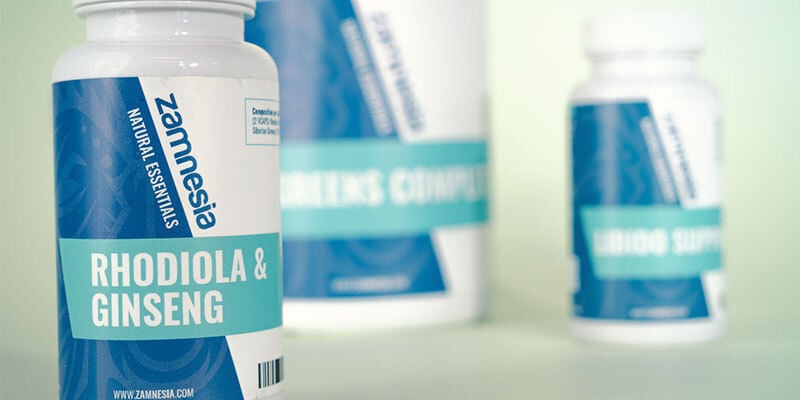
Ginseng is a root belonging to the Panax genus. When harvested, Panax ginseng, also called Chinese ginseng or Korean ginseng, is used in a wide variety of settings, with a focus on promoting a host of potential wellness benefits. The name “ginseng” comes from the Chinese word “rénshēn”, which essentially means “person” (rén) and “plant root” (shēn). The name is a reflection of the fact that ginseng has a shape not unlike a person, with long, limb-like appendages. But name aside, just how far does ginseng's use date back?
The origins of ginseng

It's argued that ginseng was first used well over 4,500 years ago. However, recorded use dates back to 196 AD in China, where it was initially utilised as a means of providing a burst of revitalising energy, and to address states such as insomnia and gastritis. The viability of these uses are hotly debated in the modern world, but that certainly hasn't stunted ginseng's popularity.
What is the difference between ginseng and ginger?
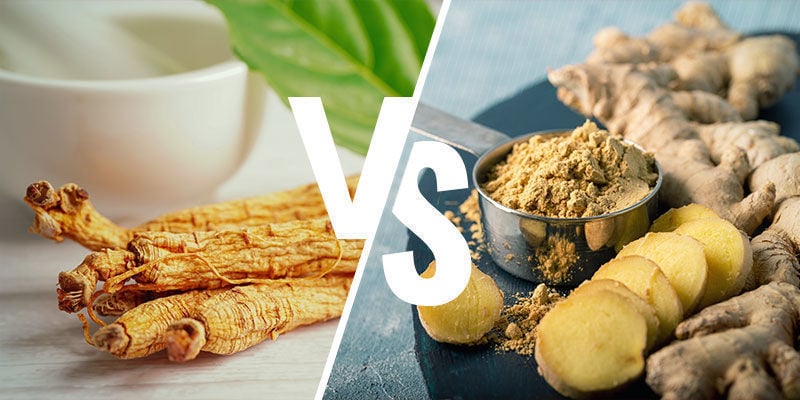
Similar in appearance and with similar applications, ginger and ginseng often appear as bedfellows in the world of natural supplements, with many believing the two are interchangeable. However, ginseng and ginger are indeed entirely different plants. Still, both roots have been used for thousands of years in traditional holistic practices, specifically traditional Chinese medicine (TCM), and feature an abundance of vitamin c, zinc, and magnesium. But their differences are also fairly stark. For example, due to the sweet yet spicy flavour ginger provides, it's used more often in cooking compared to ginseng. Moreover, ginseng can potentially boost the function of the immune system, whereas ginger cannot.
Adding to the confusion is the fact that Korean ginseng is the most commonly used type in areas such as China and Korea, and is known for having more stimulating effects, whereas American ginseng, found in Canada and America, offers up more relaxing effects. There's also Siberian ginseng, which, though used for similar purposes, is technically not a type of ginseng at all.
How does ginseng work?
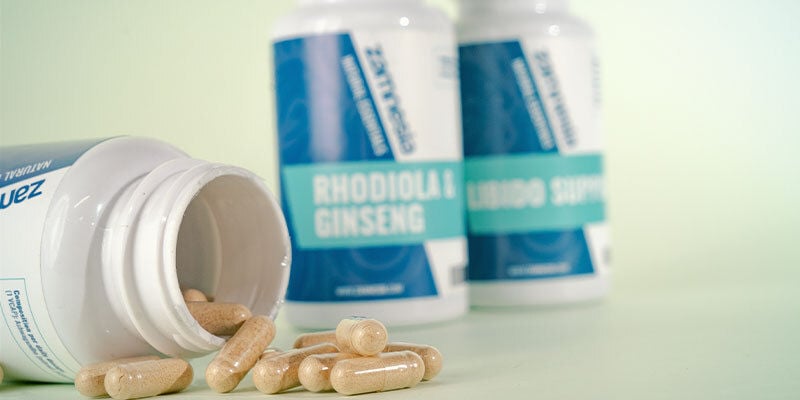
Now that we have an understanding of what ginseng is, how does it work in the body? As mentioned, there are plenty of potential effects that come with using ginseng, and there are several different ways to experience them. Traditionally, the root is eaten raw, but it can also be steamed before consumption. In modern times, ginseng is typically dried and then ground into a fine powder before being ingested in recipes or in capsules. Regardless of the method, once ingested, ginseng interacts with the body and mind to exert a range of effects that may benefit wellness. Although the mechanism(s) of action of Korean and American ginseng are not fully elucidated, researchers have noted some compelling effects in humans.
The potential benefits of ginseng

Rich in antioxidants and researched in relation to its effect on inflammation, ginseng contains two key compounds believed to be responsible for many of the root’s potential benefits: ginsenosides and gintonin. Of course, the effects of ginseng will vary from person to person, but below are a few areas in which ginseng may impact well-being.
Energy and fatigue
Ginseng, more specifically the Korean variety, has been researched for its potential to boost energy and stave off the effects of feeling fatigued. A study carried out in 2013 (Kim et al.) showed that, over the course of 4 weeks, a group of 90 people who were given 1 or 2 grams of ginseng experienced a reduction in both mental and physical fatigue compared to placebo.
Cognition and mood
It's thought that ginseng also has the potential to positively impact aspects of cognition, such as memory, as well as mood. While there are no psychoactive, euphoric elements to ginseng, a study from 2002 (Ellis & Reddy) shows the effect of ginseng on general quality of life. A group of 30 volunteers were given 200mg of ginseng per day for 4 weeks, at the end of which researchers noted an impact on mental health and an overall positive change in mood. However, after a period of 8 weeks, these effects appeared to diminish, potentially meaning that the impact of ginseng on brain function could be short term in effect.
Inflammation
Given its abundance of active compounds, ginseng has been studied in the modern era for its effect on inflammation. One study (Jung et al., 2011) administered 2 grams of Korean ginseng, three times per day, to 18 male volunteers for seven days. The volunteers were tested at the end of each day, and it was noted that each displayed significantly lower inflammatory markers.
Erectile dysfunction
Ginseng has also been observed for its impact on erectile dysfunction. There is scientific research to suggest that taking ginseng can lower oxidative stress levels, in turn increasing blood flow to the penile muscles. One such study (Choi et al., 1995) notes a 60% improvement among participants taking Korean ginseng compared to those using regular erectile dysfunction medication.
Is ginseng safe to use?
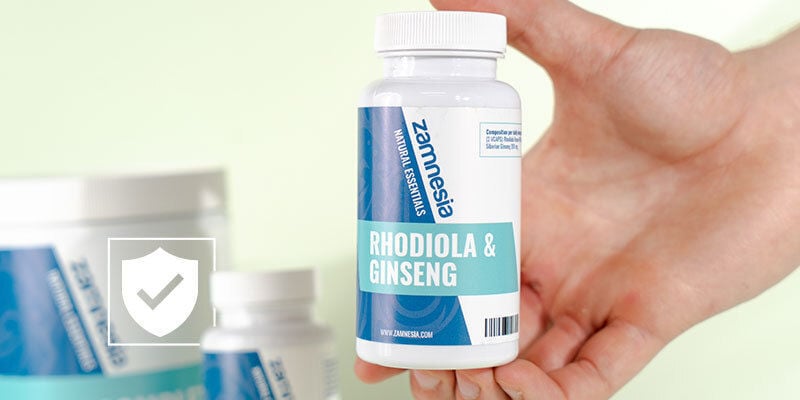
Given the varying methods of administration, it's easy to find a way to use ginseng that suits you and offers the ideal dose for your needs. However, it's advised that pregnant or breastfeeding women steer clear of using ginseng, as there is not enough information to support its consumption during these stages. Also, due to the energy-boosting nature of ginseng, those with heart conditions should consult a medical professional before taking it.
Possible side effects of ginseng
As is the case with most supplements or vitamins, the over-consumption of ginseng can lead to some possible side effects. While none are life-threatening or particularly severe, it's advised you stop taking ginseng should you experience any of the following:
- Headaches
- Nausea
- Diarrhoea
- Rapid heartbeat
- Rash
If you have any concerns regarding any of these side effects, consult a medical professional before consuming ginseng.
Discover the power of ginseng for yourself
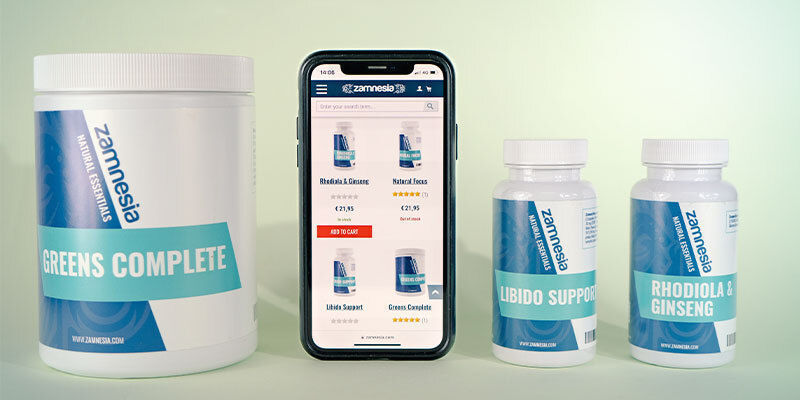
Now that you're well-versed in all things ginseng, how can you experience it for yourself? While you can visit your local supermarket to pick up ginseng teas and juices, did you know there are far easier ways to introduce a little ginseng into your daily life? Zamnesia's Healthshop has you covered with top-quality products featuring ginseng as a main or complementary ingredient, allowing you to get the most out of this root’s wellness potential. By simply taking a couple capsules a day, you can discover the versatile power of ginseng for yourself.

- Choi HK, Seong DH, & Rha KH. (1995 Sep). Choi, H. K., Seong, D. H., & Rha, K. H. (1995). Clinical efficacy of Korean red ginseng for erectile dysfunction. International Journal of Impotence Research, 7(3), 181–186. - https://pubmed.ncbi.nlm.nih.gov
- Ellis, J. M., & Reddy, P. (2002). Effects of Panax Ginseng on Quality of Life. Annals of Pharmacotherapy, 36(3), 375–379. - https://journals.sagepub.com
- Hyeong-Geug Kim, Jung-Hyo Cho, Sa-Ra Yoo, Jin-Seok Lee, Jong-Min Han, Nam-Hun Lee, Yo-Chan Ahn, & Chang-Gue Son. (Apr 17, 2013). Antifatigue Effects of Panax ginseng C.A. Meyer: A Randomised, Double-Blind, Placebo-Controlled Trial - https://journals.plos.org
- Jung, H. L., Kwak, H. E., Kim, S. S., Kim, Y. C., Lee, C. D., Byurn, H. K., & Kang, H. Y. (2011). Effects of Panax ginseng supplementation on muscle damage and inflammation after uphill treadmill running in humans. The American Journal of Chinese Medicine, 39(3), 441–450. - https://www.worldscientific.com
- France
- Germany
- International
- Italy
- Netherlands
- Spain
- United Kingdom
- United States
You might also like
-
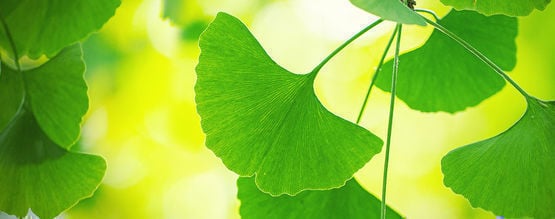
 6 min
18 October 2022
Getting The Most Out Of Ginkgo Biloba
As a type of tree dating back many millions of years, Ginkgo biloba has long been utilised for holistic purposes. From promoting sleep readiness to potentially improving mood, there is plenty to disco ...
6 min
18 October 2022
Getting The Most Out Of Ginkgo Biloba
As a type of tree dating back many millions of years, Ginkgo biloba has long been utilised for holistic purposes. From promoting sleep readiness to potentially improving mood, there is plenty to disco ...
-

 8 min
24 November 2020
What Is Blue Lotus?
The blue lotus also known as blue water lily was widely popular in ancient Egypt. Learn everything about the blue lotus and find out about its uses and effects. ...
8 min
24 November 2020
What Is Blue Lotus?
The blue lotus also known as blue water lily was widely popular in ancient Egypt. Learn everything about the blue lotus and find out about its uses and effects. ...
-

 5 min
30 April 2020
10 Best Herbs To Brew A Tea With
At least since the ancient Egyptians, herbs have been brewed into tea. Teas can be used as stimulants and sedatives or even as aphrodisiacs. Use vaping herbs to make teas that can be beneficial in sev ...
5 min
30 April 2020
10 Best Herbs To Brew A Tea With
At least since the ancient Egyptians, herbs have been brewed into tea. Teas can be used as stimulants and sedatives or even as aphrodisiacs. Use vaping herbs to make teas that can be beneficial in sev ...
-

 2 min
15 February 2019
Damiana: Everything You Need To Know
2 min
15 February 2019
Damiana: Everything You Need To Know
Categories
-
Seed Shop
- Feminized Cannabis Seeds
- Autoflowering Cannabis Seeds
- Regular Cannabis Seeds
- F1 Hybrids
- CBD Seeds
- Zamnesia Seeds
- Top 10 Autoflowering Seeds
- Top 10 Regular Seeds
- Top 10 USA Cannabis Strains
- Top 10 Zamnesia Seeds
- Top 10 Feminized Seeds
- Beginner Strains
- Below 1% THC
- Classic Cannabis Strains
- Cup Winners
- F1 Hybrids
- Fast-Flowering Strains
- High CBD Strains
- High THC Strains
- Mix Packs
- Zamnesia Exclusive Collabs
- Amnesia Seeds
- Blueberry Seeds
- Cheese Seeds
- Diesel Seeds
- Gorilla Seeds
- Haze Seeds
- Kush Seeds
- Purple Seeds
- Skunk Seeds
- White Widow Seeds
- Zamnesia Seeds
- ACE Seeds
- Advanced Seeds
- Amsterdam Genetics
- Anesia Seeds
- Auto Seeds
- Barney's Farm
- Big Buddha Seeds
- Bomb Seeds
- BSB Genetics
- BSF Seeds
- Buddha Seeds
- Bulldog Seeds
- Cali Connection
- Cannarado Genetics
- CannaBioGen
- CBD Crew
- CBD Seeds
- Compound Genetics
- The Dank Seeds
- Dark Horse Genetics
- Delicious Seeds
- Devil Harvest Original
- Dinafem
- DNA Genetics
- Doctor's Choice
- Dr. Underground
- Dutch Passion
- Elite Seeds
- Eva Seeds
- Exotic Seed
- Expert Seeds
- FastBuds
- Female Seeds
- Fenocan
- Flash Auto Seeds
- French Touch Seeds
- Garden of Green
- GeneSeeds
- Genehtik Seeds
- G13 Labs
- Grass-O-Matic
- Greenhouse Seeds
- Grow Your Own (DNA)
- Growers Choice
- Homegrown Fantaseeds
- House of the Great Gardener
- Humboldt Seed Company
- Humboldt Seed Organization
- Kalashnikov Seeds
- Kannabia
- The Kush Brothers
- Light Buds
- Little Chief Collabs
- Medical Seeds
- Ministry of Cannabis
- Mr. Nice
- Nirvana Seeds
- Original Sensible
- Paradise Seeds
- Perfect Tree
- Pheno Finder
- Philosopher Seeds
- Positronics Seeds
- Purple City Genetics
- Pyramid Seeds
- Rare Dankness
- Reggae Seeds
- Reserva Privada
- Resin Seeds
- Ripper Seeds
- Royal Queen Seeds
- Sagarmatha Seeds
- Samsara Seeds
- Seedstockers
- Sensation Seeds
- Sensi Seeds
- Serious Seeds
- Silent Seeds
- Soma Seeds
- Spliff Seeds
- Strain Hunters
- Sumo Seeds
- Super Sativa Seed Club
- Super Strains
- Sweet Seeds
- T.H. Seeds
- Top Tao Seeds
- Vision Seeds
- VIP Seeds
- White Label
- World Of Seeds
- Zativo Seeds
- Seed Banks
-
Headshop
-
Vaporshop
-
Healthshop
-
Smartshop
- Top 10 Smartshop
- Zamnesia Gift Cards
- After Party
- Aphrodisiacs
- Aromatherapy
- Blue Lotus
- CBD Vape Juice
- Capsule Machines
- Crystals, Gemstones & Minerals
- Dream Herbs
- Drug Tests
- Extracts
- Happy Caps
- Herbal Tea
- Herbs & Seeds
- Incense
- Kanna
- Kratom
- LSA Seeds
- Mescaline Cacti
- Microdosing
- Nootropics
- Relaxing
- Salvia divinorum
- Smart Seeds
- Stimulants
- Supplements
- Tinctures
- Vape Herbs
-
Shroomshop
-
Growshop
- Top 10 Growshop
- Top 10 Plant Seeds
- All Seeds
- Cacti
- Chilli & Pepper Seeds
- Companion Plants
- Edible Plant Seeds
- Exotic Seeds
- Flower Seeds
- Fruit Seeds
- Herb Seeds
- Interior Plant Seeds
- Microgreens
- Psychoactive Plant Seeds
- Sprouting
- Vegetable Seeds
- Wellness Plant Seeds
- After Harvest
- Climate Control
- Fertilizer
- Grow Tents
- Harvest, Dry & Cure
- LED Grow Lights
- Plant Seeds
- Propagation
-
Merchandise
-
Sale section
Account
Information
Our Offers
Our website won't work without these cookies activated. Therefore functional cookies can't be disabled.























